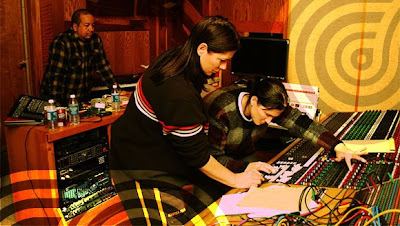The All-Wave recording movement
 It was dorm move-in day of my sophomore year of college, hot as all get out. My lovely roommate Tricia was listening to Cher’s “Believe” on repeat for that entire week, the rest of September and all into October. The vocoder-superhuman effects of Cher asking me if I did, in fact, believe in life after love still echo through my head (somewhat painfully) to this day.
It was dorm move-in day of my sophomore year of college, hot as all get out. My lovely roommate Tricia was listening to Cher’s “Believe” on repeat for that entire week, the rest of September and all into October. The vocoder-superhuman effects of Cher asking me if I did, in fact, believe in life after love still echo through my head (somewhat painfully) to this day.
Cher’s hit of 1998 is cited as the start of a new era of widespread use of tech trickery and adjustments in the music which ultimately makes it through our headphones. In a classic case of “If we have it, why don’t we use it?,” modern music production is sometimes only a matter of only how crafty one can be with the knobs — not necessarily capturing the sounds actually emitting from instruments and vocal cords. Nowadays anyone can sound like, well, anything.
Along with producer Steve Albini, Kim Deal from the Breeders has been at the forefront of designing a forward-thinking, punk-ethos upholding concept pertaining to the recording of their (and hopefully more artists’) music in the years to come: The All-Wave Recording Movement.
Their creed is loosely stated as “everything should be an analog sound recording of someone playing or singing, rather than using a computer to generate or digitally manipulate sounds separated from the dimension of time in which they were performed. In short, to record All Wave one must use no computers, no digital recording, no auto-tuning, or any other mainstays of contemporary production. A parallel drawn with the realist film movement . . . is not inappropriate.” The 2008 Breeders album Mountain Battles was recorded using All-Wave philosophy, and Deal has even designed a pretty kickass logo (above) to shine as a beacon from the cases of those albums that would choose to adopt this philosophy as well.
The goal, Steve Albini writes, is to create a movement that is “at least as significant as the Ska revival, or perhaps the WNBA.” Ooh, godspeed with that one.
Bang On – The Breeders




 Name: Heather Browne
Name: Heather Browne
can almost equate it to the ‘dogma’ style of filmmaking. . . .
Anonymous — August 11, 2008 @ 1:09 am
http://www.newyorker.com/arts/critics/musical/2008/06/09/080609crmu_music_frerejones?currentPage=all
Sasha Frere-Jones re: auto-tune, from The New Yorker.
thomas — August 11, 2008 @ 7:25 am
I wondered what that logo on Mountain Battles was all about. It’s a pretty darn good record, especially after you warm up to it with a listen or two.
Ben — August 11, 2008 @ 3:44 pm
How did I miss this story, being the Breeders freak that I am? The Breeders= It’s All Good Even When It’s Not.
spookycat — September 12, 2009 @ 3:15 pm